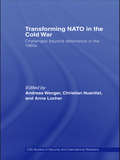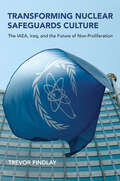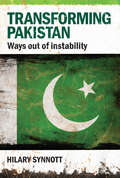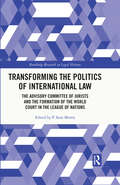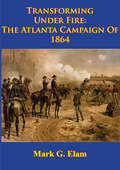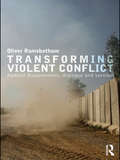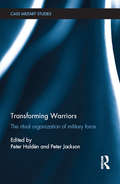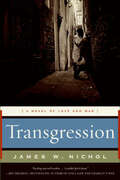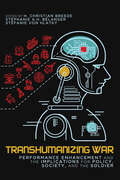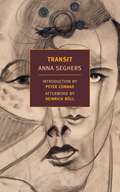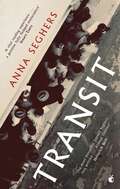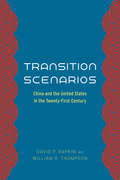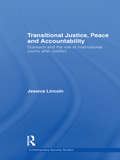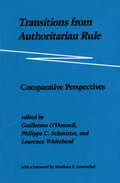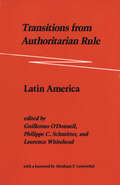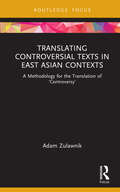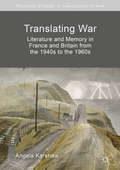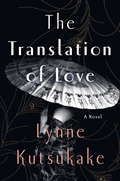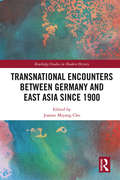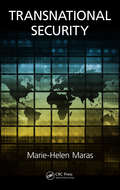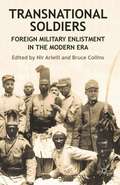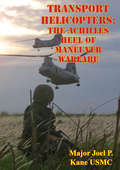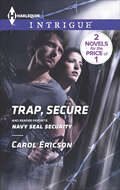- Table View
- List View
Transforming NATO in the Cold War: Challenges beyond Deterrence in the 1960s (CSS Studies in Security and International Relations)
by Andreas Wenger Christian Nuenlist Anna LocherThe first comprehensive history of NATO in the 1960s, based on the systematic use of multinational archival evidence. This new book is the result of a gathering of leading Cold War historians from both sides of the Atlantic, including Jeremi Suri, Erin Mahan, and Leopoldo Nuti. It shows in great detail how the transformation of NATO since 1991 has opened up new perspectives on the alliance’s evolution during the Cold War. Viewed in retrospect, the 1960s were instrumental to the strengthening of NATO's political clout, which proved to be decisive in winning the Cold War – even more so than NATO's defense and deterrence capabilities. In addition, it shows that NATO increasingly served as a hub for state, institutional, transnational, and individual actors in that decade. Contributions to the book highlight the importance of NATO's ability to generate "soft power", the scope and limits of alliance consultation, the important role of common transatlantic values, and the growing influence of small allies. NATO's survival in the crucial 1960s provides valuable lessons for the current bargaining on the purpose and cohesion of the alliance. This book will be of much interest to students of international history, Cold War studies and strategic studies.
Transforming Nuclear Safeguards Culture: The IAEA, Iraq, and the Future of Non-Proliferation (Belfer Center Studies in International Security)
by Trevor FindlayThe role of organizational culture in international efforts to stop the spread of nuclear weapons.In Transforming Nuclear Safeguards Culture, Trevor Findlay investigates the role that organizational culture may play in preventing the spread of nuclear weapons, examining particularly how it affects the nuclear safeguards system of the International Atomic Energy Agency (IAEA), the paramount global organization in the non-proliferation field. Findlay seeks to identify how organizational culture may have contributed to the IAEA&’s failure to detect Iraq&’s attempts to acquire illicit nuclear capabilities in the decade prior to the 1990 Gulf War and how the agency has sought to change safeguards culture since then. In doing so, he addresses an important piece of the nuclear nonproliferation puzzle: how to ensure that a robust international safeguards system, in perpetuity, might keep non-nuclear states from acquiring such weapons. Findlay, as one of the leading scholars on the IAEA, brings a valuable holistic perspective to his analysis of the agency&’s culture. Transforming Nuclear Safeguards Culture will inspire debate about the role of organizational culture in a key international organization—a culture that its member states, leadership, and staff have often sought to ignore or downplay.
Transforming Pakistan: Ways Out of Instability (Adelphi series)
by Hilary SynnottThis book argues that any strategy for dealing with Pakistan requires an understanding of the country’s complex and turbulent history and of the weaknesses of its political and other institutions. It describes how, in the absence of an inherent national identity, successive military and civilian governments have made use of Islam and Kashmir, ‘the unfinished business of Partition’, for political purposes. It also examines the role of the army and of its intelligence service, the ISI, in relation to India, Afghanistan and internal political manipulation. The nature and history of the tribal regions in Pakistan and Afghanistan, which are little understood in the West and which explain much of the animosity towards the US, are also described in detail. After 9/11, Pakistan's support for counter-terrorism and military operations in Afghanistan increased the population’s animosity towards the West and hence the government’s difficulties in delivering. Meanwhile, the military leadership hedged its bets by maintaining links with militant organisations and with a re-emerged Taliban. With the arrival of an elected leadership, the emergence of simultaneous political, economic and security crises, tactical errors by the West, and the Mumbai terrorist attacks in late 2008, the situation was complicated further. The book concludes with recommendations, aimed particularly at the new US administration, for a durable long-term relationship with Pakistan, entailing increased attention and resources devoted to institution-building and, over time, the reduction of the role and influence of the army.
Transforming the Politics of International Law: The Advisory Committee of Jurists and the Formation of the World Court in the League of Nations (Routledge Research in Legal History)
by P. Sean MorrisThis volume examines the role of League of Nations committees, particularly the Advisory Committee of Jurists (ACJ) in shaping the statute of the Permanent Court of International Justice (PCIJ). The authors explore the contributions of individual jurists and unofficial members in shaping the League’s international legal machinery. It is a companion book to The League of Nations and the Development of International Law: A New Intellectual History of the Advisory Committee of Jurists (Routledge, 2021). One of the guiding principles of the book is that the development of international law was a project of politics where the idea and notion of an international society must contend with the political visions of each state represented on the different legal committees in the League of Nations during the drafting of the Covenant. The book constitutes a major contribution to the literature in that it shows the inner workings of some of the legal committees of the League and how the political role of unofficial members was influential for the development of international law in the early twentieth century and how they influenced the political and legal process of the ACJ. The book will be an essential reference for those working in the areas of International Law, Legal History, International Relations, Political History, and European History.
Transforming Under Fire: The Atlanta Campaign Of 1864
by Mark G. ElamIncludes Civil War Map and Illustrations Pack - 224 battle plans, campaign maps and detailed analyses of actions spanning the entire period of hostilities.Many historians give William Sherman total credit for the success of the Atlanta Campaign, when in fact it was the success of the Federal team as an institution. Conversely, many blame Joseph Johnston for the Confederate loss in that campaign, when in fact he was only one cog in the Confederate war machine. It was beyond Johnston 's ability to adapt if President Jefferson Davis and the rest of the Confederate team failed in fulfilling their duties. More importantly, the Federal team adapted during the middle of the war. In short they were able to transform the way they fought the war. The Confederates in the west were never able to do the same.
Transforming Violent Conflict: Radical Disagreement, Dialogue and Survival (Routledge Studies in Peace and Conflict Resolution)
by Oliver RamsbothamThis book investigates intractable conflicts and their main verbal manifestation - radical disagreement – and explores what can be done when conflict resolution fails. The book identifies agonistic dialogue - dialogue between enemies - as the key to linguistic intractability. It suggests how agonistic dialogue can best be studied, explored, understood and managed even in the most severe political conflicts when negotiation, mediation, problem solving, dialogue for mutual understanding, and discourse ethics are unsuccessful. This approach of viewing radical disagreement as the central topic of analysis and conflict management is a new innovation in this field, and also supplements and enhances existing communicative transformational techniques. It also has wider implications for cognate fields, such as applied ethics, democratic theory, cultural studies and the philosophy of difference. This book will be of great interest to students of conflict resolution, peace and conflict studies, ethnic conflict and International Relations in general. Oliver Ramsbotham is Emeritus Professor of Conflict Resolution at the University of Bradford, UK, Chair of the Oxford Research Group, President of the Conflict Research Society and co-author of Conflict Resolution in Contemporary Conflict.
Transforming Warriors: The Ritual Organization of Military Force (Cass Military Studies)
by Peter Haldén Peter JacksonThis volume offers an interdisciplinary study of how different cultures have sought to transform individuals into warriors. War changes people, however a less explored question is how different societies want people to change as they are turned into warriors. When societies go to war they recognize that a boundary is being crossed. The participants are expected to do things that are otherwise prohibited, or at least governed by different rules. This edited volume analyses how different cultures have conceptualized the transformations of an individual passing from a peacetime to a wartime existence to become an active warrior. Despite their differences, all societies grapple with the same question: how much of the individual’s peace-self should be and can be retained in the state of war? The book explores cases such as the Nordic berserkers, the Japanese samurai, and European knights, as well as modern soldiers in Germany, Liberia, and Sweden. It shows that archaic and modern societies are more similar than we usually think: both kinds of societies use myths, symbols, and rituals to create warriors. Thus, this volume seeks to redefine theories of modernization and secularization. It shows that military organizations need to take myths, symbols, and rituals seriously in order to create effective units. This book will be of much interest to students of military studies, war studies, sociology, religion, and international relations in general.
Transgression: A Novel of Love and War
by James W. NicholA tale of love and war, Transgression by James W. Nichol is part romance, part mystery, and part riveting historical novel set during World War Two in Europe and in North America in the years directly following the terrible conflict. Nichol—winner of the Arthur Ellis Award and shortlisted for the UK’s Gold Dagger Award for his debut novel Midnight Cab—tells the haunting story of a young French woman undone by love during the Nazi occupation of her country and branded a “horizontal collaborator” after its liberation. Beautifully written and unforgettable, Transgression is a novel about secrets and survival and the high price that must be paid for passion.
Transhumanizing War: Performance Enhancement and the Implications for Policy, Society, and the Soldier (Human Dimensions in Foreign Policy, Military Studies, and Security Studies #9)
by H. Christian Breede Stéphanie A.H. Bélanger Stéfanie Von HlatkyThe concept of soldier enhancement often invokes images of dystopian futures populated with dehumanized military personnel. These futures serve as warnings in science fiction works, and yet the enhancement of soldiers' combat capability is almost as old as war itself. Today, soldier enhancement is the purpose of military training and the application of innovative technologies, but when does it begin to challenge individuals' very humanity? Bringing together the work of a diverse group of practitioners and academics, Transhumanizing War examines performance enhancement in the military from a wide range of perspectives. The book builds on two key premises: that rapid advances in science and technology are outstripping governments' and military organizations' capacity to adapt, and that this has put pressure on the connection between the military and the public. The contributors to this collection grapple with the implications of continued technological advancement and the possibility that innovative solutions to performance enhancement will risk further alienating the soldier from society. Navigating the fine line between technological promise and ethics, this volume presents a guide to responsible implementation in Canada and abroad. Offering unique insights into a debate on the bleeding edge of public discourse, Transhumanizing War considers the best ways to improve combat effectiveness while still preserving soldiers' humanity. Contributors include G. de Boisboissel (St Cyr), Linda Bossi (Defence Research and Development Canada), David Bryant (Defence Research and Development Canada), Colin Farrelly (Queen's University), Sara Greco (Queen's University), Monica Jones (University of Michigan), Thomas Karakolis (Defence Research and Development Canada), Allan Keefe (Defence Research and Development Canada), Maxwell Mehlmen (Case Western Reserve University), Farzana Nabi (US Army), K. Niall (Defence Research and Development Canada), David Tack (Defence Research and Development Canada), A. Vergin (Deutsche Bundeswehr), Randall Wakelam (Royal Military College of Canada), and Vicki Woodside-Duggins (Canadian Defence Academy).
Transhumanizing War: Performance Enhancement and the Implications for Policy, Society, and the Soldier (Human Dimensions in Foreign Policy, Military Studies, and Security Studies)
by H. Christian Breede, Stéphanie A.H. Bélanger, and Stéfanie Von HlatkyThe concept of soldier enhancement often invokes images of dystopian futures populated with dehumanized military personnel. These futures serve as warnings in science fiction works, and yet the enhancement of soldiers' combat capability is almost as old as war itself. Today, soldier enhancement is the purpose of military training and the application of innovative technologies, but when does it begin to challenge individuals' very humanity? Bringing together the work of a diverse group of practitioners and academics, Transhumanizing War examines performance enhancement in the military from a wide range of perspectives. The book builds on two key premises: that rapid advances in science and technology are outstripping governments' and military organizations' capacity to adapt, and that this has put pressure on the connection between the military and the public. The contributors to this collection grapple with the implications of continued technological advancement and the possibility that innovative solutions to performance enhancement will risk further alienating the soldier from society. Navigating the fine line between technological promise and ethics, this volume presents a guide to responsible implementation in Canada and abroad. Offering unique insights into a debate on the bleeding edge of public discourse, Transhumanizing War considers the best ways to improve combat effectiveness while still preserving soldiers' humanity.
Transit
by Peter Conrad Anna Seghers Heinrich Boll Margot Bettauer DemboAnna Seghers's Transit is an existential, political, literary thriller that explores the agonies of boredom, the vitality of storytelling, and the plight of the exile with extraordinary compassion and insight. Having escaped from a Nazi concentration camp in Germany in 1937, and later a camp in Rouen, the nameless twenty-seven-year-old German narrator of Seghers's multilayered masterpiece ends up in the dusty seaport of Marseille. Along the way he is asked to deliver a letter to a man named Weidel in Paris and discovers Weidel has committed suicide, leaving behind a suitcase containing letters and the manuscript of a novel. As he makes his way to Marseille to find Weidel's widow, the narrator assumes the identity of a refugee named Seidler, though the authorities think he is really Weidel. There in the giant waiting room of Marseille, the narrator converses with the refugees, listening to their stories over pizza and wine, while also gradually piecing together the story of Weidel, whose manuscript has shattered the narrator's "deathly boredom," bringing him to a deeper awareness of the transitory world the refugees inhabit as they wait and wait for that most precious of possessions: transit papers.
Transit (Virago Modern Classics #807)
by Anna SeghersINTRODUCED BY STUART EVERS: 'A genuine, fully fledged masterpiece of the twentieth century; one that remains just as terrifyingly relevant and truthful in the twenty-first'An existential, political, literary thriller first published in 1944, Transit explores the plight of the refugee with extraordinary compassion and insight. Having escaped from a Nazi concentration camp in Germany and a work camp in Rouen, the nameless narrator finds himself in the dusty seaport of Marseille. Along the way he was asked to deliver a letter to Weidel, a writer in Paris whom he discovered had killed himself as the Nazis entered the city. Now he is in search of the dead man's wife. He carries Weidel's suitcase, which contains an unfinished novel - and a letter securing Weidel a visa to escape France.Assuming the name Seidler - though the authorities think he is in fact Weidel - he goes from cafe to cafe looking for Marie, who is in turn anxiously searching for her husband. As Seidler converses with refugees over pizza and wine, their stories gradually break down his ennui, bringing him a deeper awareness of the transitory world they inhabit as they wait and wait for that most precious of possessions: transit papers.'This novel, completed in 1942, is in my opinion the most beautiful Seghers has written . . . almost flawless' - Heinrich Boll
Transition Scenarios: China and the United States in the Twenty-First Century
by David P. Rapkin William R. ThompsonChina's rising status in the global economy alongside recent economic stagnation in Europe and the United States has led to considerable speculation that we are in the early stages of a transition in power relations. Commentators have tended to treat this transitional period as a novelty, but history is in fact replete with such systemic transitions--sometimes with perilous results. Can we predict the future by using the past? And, if so, what might history teach us? With Transition Scenarios, David P. Rapkin and William R. Thompson identify some predictors for power transitions and take readers through possible scenarios for future relations between China and the United States. Each scenario is embedded within a particular theoretical framework, inviting readers to consider the assumptions underlying it. Despite recent interest in the topic, the probability and timing of a power transition--and the processes that might bring it about--remain woefully unclear. Rapkin and Thompson's use of the theoretical tools of international relations to crucial transitions in history helps clarify the current situation and also sheds light on possible future scenarios.
Transitional Justice, Peace and Accountability: Outreach and the Role of International Courts after Conflict (Contemporary Security Studies)
by Jessica LincolnThe book looks at the outreach and communication strategies employed by internationalised courts to try to understand the wider impact of international justice. This book critically examines the role of outreach within international justice focusing specifically on the role of outreach at the Special Court for Sierra Leone (SCSL). It contributes to understanding of the relationship between international courts and the affected populations; an area currently underexplored and little understood. The assumption that justice brings peace underpins much of the thinking, and indeed action, of international justice, yet little is known if this is actually the case. Significant questions surrounding the link between peace and justice remain: do trials deter would-be war criminals; is justice possible for the most heinous crimes; can international justice replace local justice? This book explores these questions in relation to recent developments in international justice that have both informed and shaped the creation of the hybrid tribunal in Sierra Leone. Through empirical analysis, Transitional Justice, Peace and Accountability, answers these questions and provides an insight into individual and community perceptions of international justice. This book will be of much interest to students of transitional justice, war crimes, peace and conflict studies, human rights, international law, and IR in general.
Transitions from Authoritarian Rule: Comparative Perspectives
by Guillermo O’Donnell Philippe C. Schmitter Laurence WhiteheadAn array of internationally noted scholars examines the process of democratization in Southern Europe and Latin America. The authors provide new interpretations of both current and historical efforts of nations to end periods of authoritarian rule and to initiate transition to democracy, efforts that have met with widely varying degrees of success and failure. Extensive case studies of individual countries, a comparative overview, and a synthesis conclusions offer important insights for political scientists, students, and all concerned with the prospects for democracy. In Volume 3, despite the unique contexts of transitions in individual countries, significant points of comparison emerge — such as the influence of foreign nations and the role of agents outside the government. These analyses explore both intra- and interregional similarities and differences.
Transitions from Authoritarian Rule: Latin America
by Guillermo O’Donnell Philippe C. Schmitter Laurence WhiteheadAn array of internationally noted scholars examines the process of democratization in southern Europe and Latin America. They provide new interpretations of both current and historical efforts of nations to end periods of authoritarian rule and to initiate transition to democracy, efforts that have met with widely varying degrees of success and failure. Extensive case studies of individual countries, a comparative overview, and a synthesis conclusions offer important insights for political scientists, students, and all concerned with the prospects for democracy. Political democracy is not the only possible outcome of transitions from authoritarianism. The authors draw out the implications of democracy as a goal and of the uncertainty inherent in transitional situations. Democratization is perhaps the central issue in Latin American politics today. Case studies focus on Argentina, Bolivia, Brazil, Chile, Mexico, Peru, Uruguay and Venezuela.
Translating Controversial Texts in East Asian Contexts: A Methodology for the Translation of ‘Controversy’ (Routledge Advances in Translation and Interpreting Studies)
by Adam ZulawnikZulawnik focuses on the broad concept of ‘controversy’ and issues pertaining to the translation of politically and historically controversial texts in East Asia. The research methodology is exemplified through a case study in the form of the author’s translation of the best-selling Japanese graphic novel (manga) Manga Kenkanryū (Hate Hallyu: The Comic) by Sharin Yamano (2005), a work that has been problematised as an attack on South Korean culture and the Korean Wave. Issues analysed and discussed in the research include translation risk, ethics, a detailed methodology for the translation of so-called controversial texts exemplified through numerous thematically divided examples from the translation of the chosen Japanese text, as well as examples from a Korean language equivalent (Manhwa Hyeomillyu – Hate Japanese Wave), and definition and contextualisation of the concept of ‘controversy’. There has been limited research in the field of translation studies, which seeks to exemplify potential pragmatic approaches for the translation of politically-charged texts, particularly in multi-modal texts such as the graphic novel. It is hoped that Zulawnik’s research will serve both as a valuable source when examining South Korea–Japan relations and a theoretical and methodological base for further research and the development of an online augmented translation space with devices specifically suited for the translation of multi-modal texts such as – but not limited to – graphic novels and visual encyclopaedias.
Translating War: Literature and Memory in France and Britain from the 1940s to the 1960s (Palgrave Studies in Languages at War)
by Angela KershawThis book examines the role played by the international circulation of literature in constructing cultural memories of the Second World War. War writing has rarely been read from the point of view of translation even though war is by definition a multilingual event, and knowledge of the Second World War and the Holocaust is mediated through translated texts. Here, the author opens up this field of research through analysis of several important works of French war fiction and their English translations. The book examines the wartime publishing structures which facilitated literary exchanges across national borders, the strategies adopted by translators of war fiction, the relationships between translated war fiction and dominant national memories of the war, and questions of multilingualism in war writing. In doing so, it sheds new light on the political and ethical questions that arise when the trauma of war is represented in fiction and through translation. This engaging work will appeal to students and scholars of translation, cultural memory, war fiction and Holocaust writing.
The Translation of Love: A Novel
by Lynne KutsukakeAn emotionally gripping portrait of post-war Japan, where a newly repatriated girl must help a classmate find her missing sister.After spending the war years in a Canadian internment camp, thirteen-year-old Aya Shimamura and her father are faced with a gut-wrenching choice: Move east of the Rocky Mountains or go "back" to Japan. Barred from returning home to the west coast and bitterly grieving the loss of Aya's mother during internment, Aya's father signs a form that enables the government to deport them. But war-devastated Tokyo is not much better. Aya's father struggles to find work, compromising his morals and toiling long hours. Meanwhile Aya, born and raised in Vancouver, is something of a pariah at her school, bullied for being foreign and paralyzed when asked to communicate in Japanese. Aya's alienation is eventually mitigated by one of her principal tormenters, a willful girl named Fumi Tanaka, whose older sister has mysteriously disappeared.When a rumor surfaces that General MacArthur, who is overseeing the Occupation, might help citizens in need, Fumi enlists Aya to compose a letter asking him to find her beloved sister. The letter is delivered into the reluctant hands of Corporal Matt Matsumoto, a Japanese American serving with the Occupation forces, whose endless job is translating the thousands of letters MacArthur receives each week. Matt feels an affinity toward Fumi but is largely powerless, and the girls decide to take matters into their own hands, venturing into the dark and dangerous underside of Tokyo's Ginza district. Told through rich, interlocking storylines, The Translation of Love mines this turbulent period to show how war irrevocably shapes the lives of people on both sides--and yet the novel also allows for a poignant spark of resilience, friendship, and love that translates across cultures and borders to stunning effect.From the Hardcover edition.
Transnational Dynamics of Civil War
by Jeffrey T. CheckelCivil wars are the dominant form of violence in the contemporary international system, yet they are anything but local affairs. This book explores the border-crossing features of such wars by bringing together insights from international relations theory, sociology, and transnational politics with a rich comparative-quantitative literature. It highlights the causal mechanisms – framing, resource mobilization, socialization, among others – that link the international and transnational to the local, emphasizing the methods required to measure them. Contributors examine specific mechanisms leading to particular outcomes in civil conflicts ranging from Chechnya, to Afghanistan, to Sudan, to Turkey. Transnational Dynamics of Civil War thus provides a significant contribution to debates motivating the broader move to mechanism-based forms of explanation, and will engage students and researchers of international relations, comparative politics, and conflict processes.
Transnational Encounters between Germany and East Asia since 1900 (Routledge Studies in Modern History)
by Joanne Miyang ChoThis volume contributes to an emerging field of Asian German Studies by bringing together cutting-edge scholarship from international scholars working in a variety of disciplines. The chapters survey transnational encounters between Germany and East Asia since 1900. By rejecting traditional dichotomies between the East and the West or the colonizer and the colonized, these essays highlight connectedness and hybridity. They show how closely Germany and East Asia cooperated and negotiated the challenges of modernity in a range of topics, such as politics, history, literature, religion, environment, architecture, sexology, migration, and sports.
Transnational Security
by Marie-Helen MarasGlobalization and the easy movement of people, weapons, and toxins across borders has transformed security into a transnational phenomenon. Preventing transnational security threats has proven to be a very difficult challenge for governments and institutions around the world. Transnational Security addresses these issues, which are at the forefront
Transnational Soldiers
by Nir Arielli Bruce CollinsWarfare in the modern era has often been described in terms of national armies fighting national wars. This volume challenges the view by examining transnational aspects of military mobilization from the eighteenth century to the present. Truly global in scope, it offers an alternative way of reading the military history of the last 250 years.
Transport Helicopters: The Achilles Heel Of Maneuver Warfare
by Major Joel P. Kane USMCMarine Corps' publication FMFM 1 describes Marine Corps doctrine on warfighting. In very broad terms, chapter 4 of Warfighting attempts to identify the challenges and realities of the modern battlefield. Marine Corps' doctrine attempts to exploit "the time-competitive rhythm of war, generating and exploiting superior tempo and velocity in an uncertain, chaotic, fluid environment." The Marine Corps employs a combined arms team to generate the combat power needed to succeed in this environment. This combined arms team is the Marine Air Ground Task Force (MAGTF).The largest deployable MAGTF is the Marine Expeditionary Force (MEF). The MEF is normally employed as a maneuver element for a larger Joint Task Force (JTF).Like the U.S. Army, the Marine Corps selected maneuver warfare as its warfighting philosophy. In theory, the MEF Commander could be a JTF Commander and could conduct operational level maneuver with his MEF and any other assigned forces. Unfortunately, the MEF cannot effectively conduct operational maneuver against a medium to high intensity threat with its current mix of assault transport helicopters. Simply stated, the Marine Corps transport helicopter fleet is not capable of supporting maneuver warfare as envisioned in FMFM 1 or Forward... From the Sea. Based upon the current Five Year Defense Plan (FYDP) and the current Marine Aviation Plan, our transport helicopters will remain the Achilles Heel of maneuver warfare in the 21st Century.
Trap, Secure and Navy SEAL Security: Navy Seal Security
by Carol EricsonAn injured woman's only hope of figuring out who she is relies upon a CIA Agent in Carol Ericson's Brothers in Arms: Fully Engaged miniseries. The last thing Miranda Lewis remembers is being shot...then tumbling over the balcony. When a sexy, blue-eyed stranger finds her, she has no memory of who she is or what she's doing in the jungles of Colombia. Gage Booker risked his life in the raid on the compound, only to discover his quarry gone and an injured woman left for dead, a woman the covert operative would be a fool to trust. But her amnesia seems real-and so does the passion exploding between them. 2 books for the price of 1! NAVY SEAL SECURITY also included in this book!
